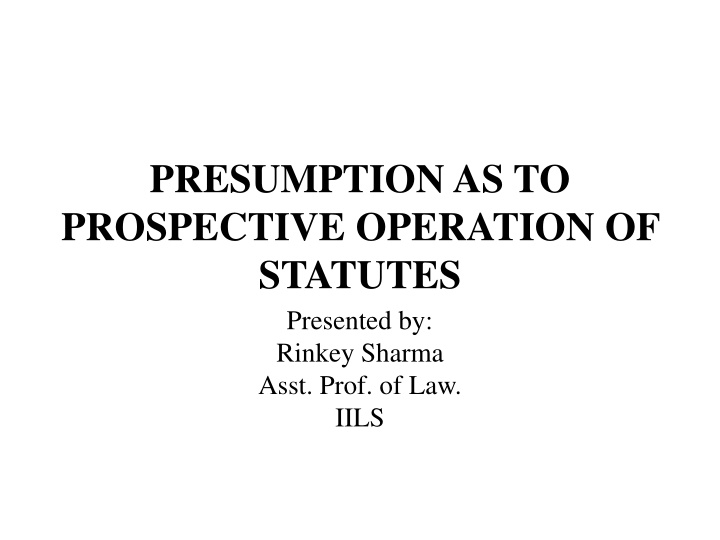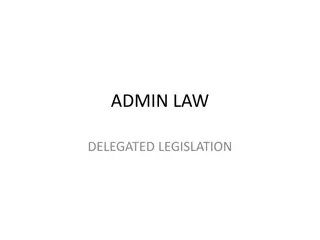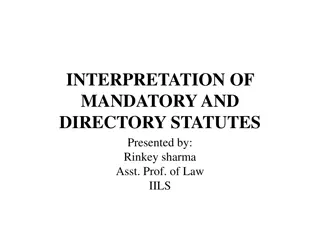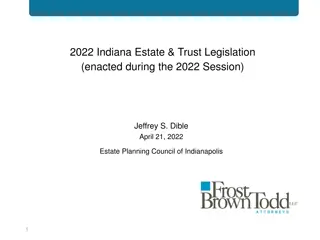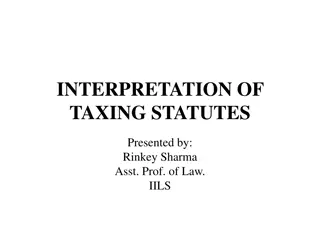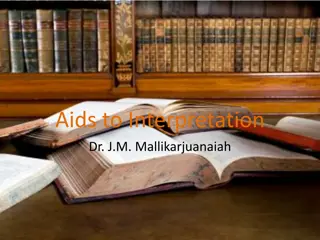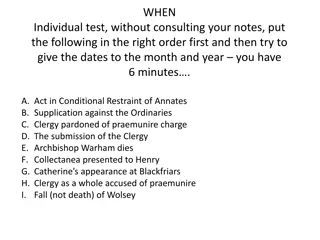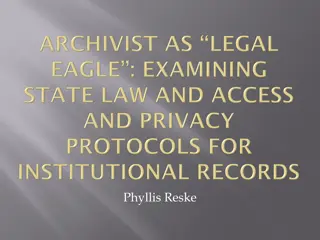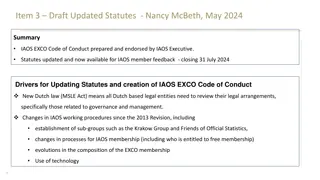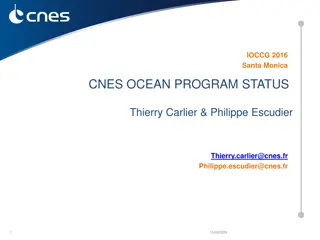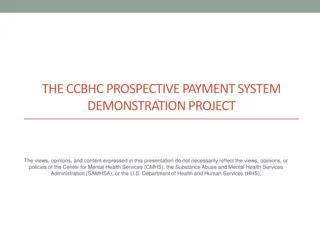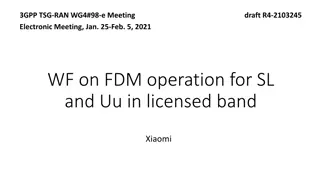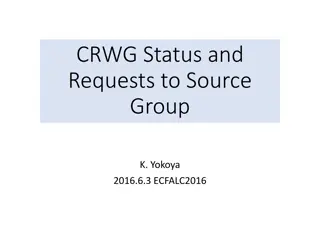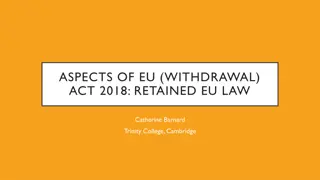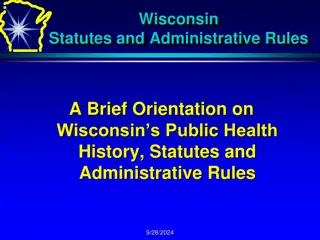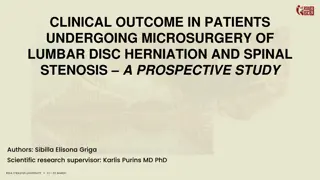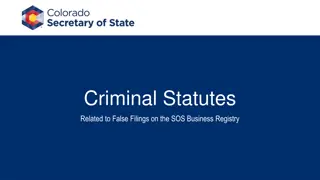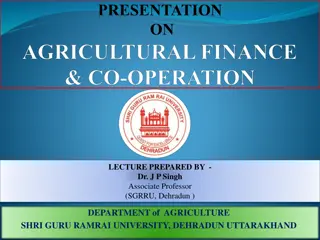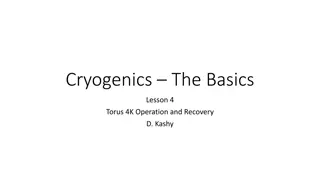Principles of Prospective Operation of Statutes in Legislation
Jurisprudence upholds the rule against retrospective legislation to protect settled matters and individual rights. The presumption is that laws should be prospective to avoid disrupting existing legal relationships. However, legislatures possess the power to enact retrospective laws, subject to certain limitations safeguarding individual rights and ensuring justice.
Download Presentation

Please find below an Image/Link to download the presentation.
The content on the website is provided AS IS for your information and personal use only. It may not be sold, licensed, or shared on other websites without obtaining consent from the author.If you encounter any issues during the download, it is possible that the publisher has removed the file from their server.
You are allowed to download the files provided on this website for personal or commercial use, subject to the condition that they are used lawfully. All files are the property of their respective owners.
The content on the website is provided AS IS for your information and personal use only. It may not be sold, licensed, or shared on other websites without obtaining consent from the author.
E N D
Presentation Transcript
PRESUMPTION AS TO PROSPECTIVE OPERATION OF STATUTES Presented by: Rinkey Sharma Asst. Prof. of Law. IILS
PROSPECTIVE OPERATION OF LAW A basic principle of jurisprudence is the rule against retrospective legislation. Traditionally it is assumed that statutes must have prospective retrospective operation of laws threatens to disturb and undermine the previously settled matters, private property, contractual relationships and personal liberty under the existing law. Indeed, retrospective unconstitutional as an invasion of private vested and personal liberty. Therefore, there is a strong presumption that laws are to be made prospective in operation. effect because operation is potentially
The Apex Court in Govind Das v. Income Tax Officer (1996) 1 ACC 906 had further accepted that unless the terms of a statute expressly so provide or necessarily require it, retrospective operation should not be given to a statute so as to take away or impair an existing right or create a new obligation or impose otherwise than as regards matter of procedure. If the enactment is expressed in language which is fairly capable of either prospective interpretation, construed as prospective only. a new liability retrospective ought or be it to
The Parliament or the State legislatures are endowed with plenary powers of legislation on subjects assigned to them under 7thSchedule of the Constitution and this power is to legislate laws both prospective and retroactive as incidents of plenary legislative power. But retrospective legislation inconveniences or even injustice. And therefore, retrospective legislation should be avoided. Example: Most of us regulate or conduct of affairs depending upon the prevalent law. If after a person behaves in a particular manner enters engagement, he is told that such behaviour or engagement is forbidden by law, he will be put in hardship depends and injustice may be caused to him. often causes into an
Gravity of this injustice or hardship depends upon the consequences of the conduct or affairs forbidden by law. In criminal cases, the injustice is extreme because a retrospective criminal law may seek to punish a person for doing an act when that act was not forbidden. Therefore, Article 20 of the Constitution prohibits retrospective criminal laws. legislatures to enact laws is subject to Article 20 of the Constitution. Similarly, the retrospective effect of the legislation infringes the Fundamental Rights of the people affected by such legislation. Then also, the legislation may be unconstitutional. Otherwise the legislatures have every power to legislate retrospectively. Therefore power of
It is therefore open to both prospective overruling and retrospective statutes, but a balance between public interest and private interest must always required to be maintained.
Further, even a prospective legislation may have retrospective effect if it affects the facts existing at the time of its commencement. Here, the rights are sometimes classified into two categories: 1. Existing rights. 2. Vested rights. It is only when vested rights are affected, the legislation is said to have retrospective effect. If an existing right is affected, the legislation is not retrospective merely on that ground. Otherwise all statutes will have to be applicable only to the persons born after the statute is enacted, else it will be called retrospective statute. Example: if there is an agreement of sale between two persons in respect of some property, and after the agreement is entered into, but before the sale is executed if the law prohibits sale of such properties, the agreement becomes void due to illegality and sale cannot be executed. Here, what is affected is an existing right and not a vested right. Therefore, we cannot call the legislation retrospective legislation.
If the sale is prohibited after it is executed so as to affect the already executed sale, the legislation becomes retrospective legislation because now the law is affecting not just an existing right but a vested right. Such an effect can take place in one of the following ways: 1. Where the legislature expressly prohibits the sales, which are already executed. 2. Where though the legislature does not expressly prohibits the sales which are already executed, but the necessary implication of the law is such as to prohibit the sales already executed. 3. Where the Court rule that the effect of the law is to prohibit already executed sales.
In the first case, as the legislature has expressly provided for retrospective effect, the Court has no role to play in defining its commencement. In the second case, as there is no express provision the Court will have to interpret the provision and declare that the statute has retrospective effect. Therefore, it is a matter of interpretation. Here, the Court has some role to play but that role is a limited one. In the third case, as there is neither express provision nor necessary implication, the conclusion of the Court that the statute has a retrospective effect is a result of the Construction of the statute. Here, the Court has an important role to play.
The active role of the Court is namely in the third category of the above case. Here, the Court proceed on a presumption that the law is not retrospective because where there is an ambiguity, and a doubt whether the statute is prospective or retrospective rule of functional interpretation is to be applied and of the two possible interpretation one which is inconvenient or unjust should be discarded as retrospective legislation causes injustice or inconvenience in majority of the cases the presumption is that the statute is not retrospective. But where the retrospective effect does not lead any inconvenience or injustice, this presumption is not applicable and depending upon construction, the statute may be construed as retrospective or prospective.
In contrast to the statutes dealing with substantive rights, statutes dealing with merely matter of procedure are presumed to be retrospective unless such a construction is textually inadmissible. An aggrieved person may have a right to remedy but no one has a right to remedy in a particular manner only i.e., by following a particular procedure only, as long as the procedure is not unreasonable or discriminatory. Maxwell expressed that: no person has vested right in the course of procedure. He has only right to prosecution or defence in the manner prescribed for the time being, of the Court in which the case is pending, and if, by an Act of Parliament the mode of the procedure is altered, he has no other right than to proceed according to the altered mode.
Right procedural laws, is a substantive right and it accrues to a person as soon as a case filed by or against him in the Court of original jurisdiction. Therefore amendment changing appellate Court will not to be applicable to parties whose cases are already pending before the lower Courts. A law affecting right to appeal must apply prospectively. to appeal, though, provided by any subsequent jurisdiction the of
Retrospective operation is bad only when it causes inconvenience or injustice to any party. If the legislation retrospectively confers benefits upon people, then there is no objection to this retrospective operation. On the other hand, the Courts may readily presume retrospective operation so that more number of people may get the benefit. Here, the Court will apply liberal interpretation, as the statute is a beneficial legislation. Thus, where a statutes takes away or impairs vested rights acquired under existing laws, or creates a new obligation, or imposes a new duty or attaches a new disability in respect of transactions already taken, must presumed that the legislature have no intention to give retrospective effect to such legislation.
However, when the intention is clear that the Act should have a retrospective operation, it must unquestionably be so construed, however unjust and hard the consequences may appear.
CASE Hitendra Vishnu Thakur v. State of Maharashtra AIR 1994 SC 2623 In this case the Court laid down the ambit and scope of an amending Act and its retrospective operation as follows: 1. A statute which affects substantive rights is presumed to be prospective in operation unless made retrospective, either expressly or by necessary implication, whereas a statute which merely affects procedure, unless such a construction is textually impossible, is presumed to be retrospective in its application, should be given an extended meaning and should be strictly confined to its clearly defined limits.
2. Law relating to forum and limitation is procedural in nature, whereas law relating to right to action and right to appeal even though remedial is substantive in nature. 3. Every litigant has vested right in substantive law but no such right exists in procedural law. 4. A procedural statute should not generally speaking be applied retrospectively where the result would create new disabilities or obligations or to impose new duties of transactions already accomplished. 5. A statute which not only changes the procedure but also creates rights and liabilities shall be construed to be prospective in operation unless otherwise provided, either expressly or by necessary implication.
